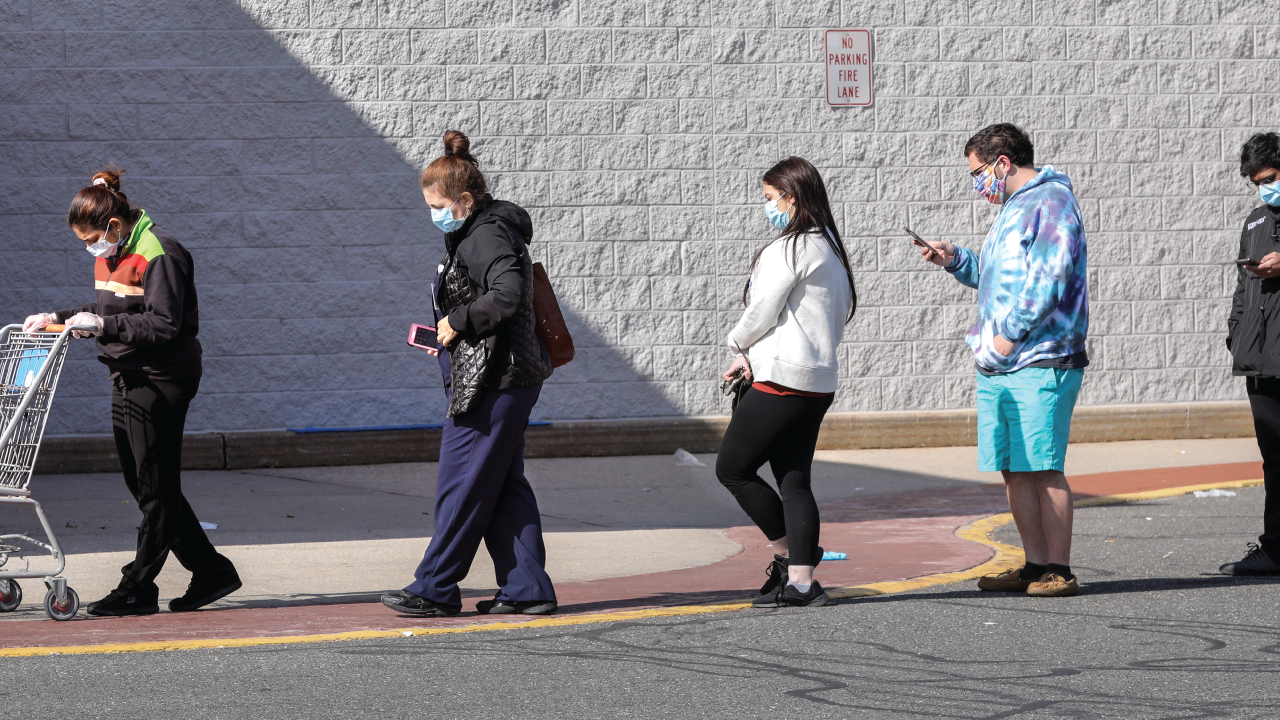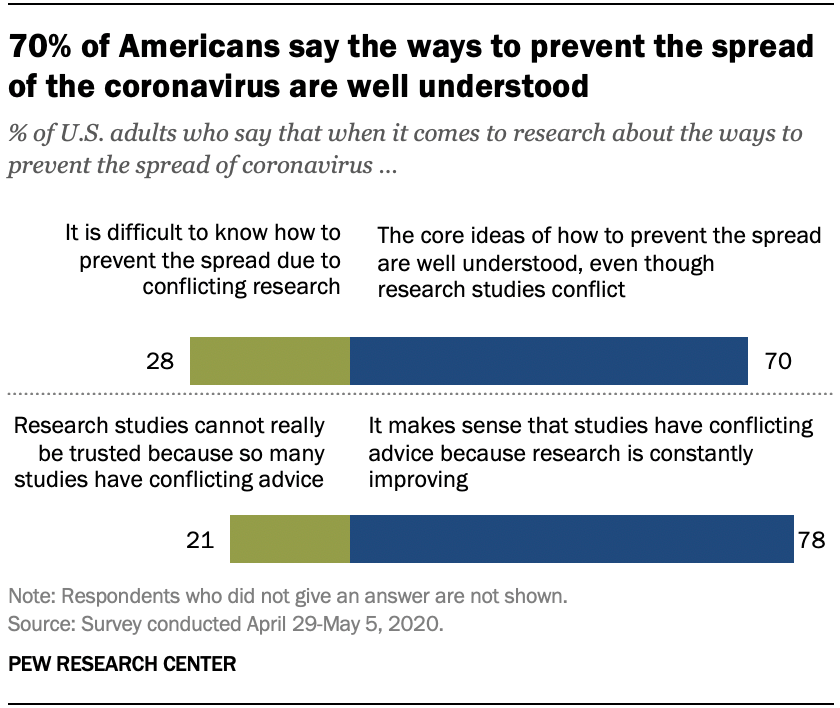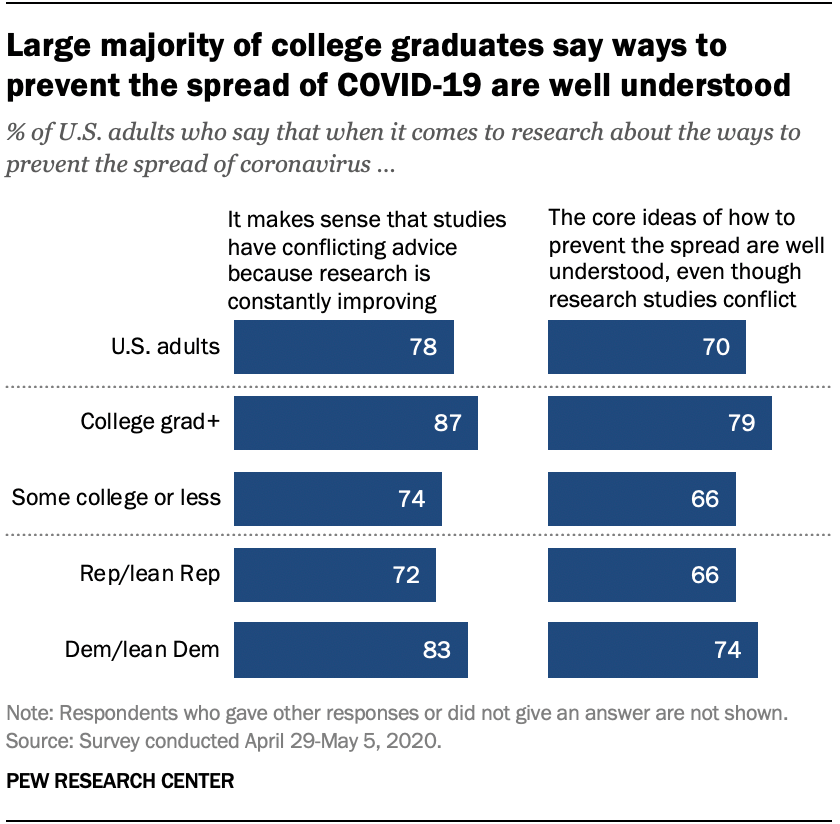
As the number of coronavirus cases continues to rise in the U.S., a majority of Americans say that the best ways to prevent the spread of the disease are pretty well understood. And even as some research studies have suggested conflicting advice about efforts to confront COVID-19, most Americans consider this to be an understandable part of the research process, rather than a sign that research studies can’t be trusted.
Seven-in-ten Americans say the core strategies for containing the coronavirus are well understood, even though research studies have yielded conflicting advice. A far smaller share (28%) says it’s difficult to know how best to prevent the spread of COVID-19, according to a Pew Research Center survey conducted April 29-May 5, 2020.
This analysis of Americans’ views of coronavirus research is based on a survey of 10,957 U.S. adults conducted from April 29 to May 5, 2020. Everyone who took part is a member of Pew Research Center’s American Trends Panel (ATP), an online survey panel that is recruited through national, random sampling of residential addresses. This way nearly all U.S. adults have a chance of selection. The survey is weighted to be representative of the U.S. adult population by gender, race, ethnicity, partisan affiliation, education and other categories. Read more about the ATP’s methodology.
Here are the questions used for this report, along with responses, and its methodology.
 As scientific understanding of the coronavirus continues to evolve, most Americans (78%) say it makes sense that studies may have conflicting advice because research is constantly improving; just 21% say research studies cannot really be trusted because so many studies have conflicting advice.
As scientific understanding of the coronavirus continues to evolve, most Americans (78%) say it makes sense that studies may have conflicting advice because research is constantly improving; just 21% say research studies cannot really be trusted because so many studies have conflicting advice.
These generally positive views of the research process come at a time when public trust in medical scientists has increased in the last year and 76% say the coronavirus outbreak has made developments in science more important for society.
Republicans and Democrats express general agreement on questions about coronavirus research and the ways to limit the spread of the disease. This stands in contrast to the large partisan differences seen in other assessments of COVID-19, including the threat to public health and current state of the outbreak.
Majorities of Democrats and those who lean to the Democratic Party (74%) and Republicans and Republican leaners (66%) say the core ideas of how to prevent the spread of the coronavirus are pretty well understood. Most Democrats (83%) and Republicans (72%) also say that it makes sense that some studies on the spread of coronavirus have conflicting advice because the research is constantly improving.
 Majorities across education levels see conflicting studies as an expected part of the research process, though college graduates (87%) are somewhat more likely to say this than those without a college degree (74%). A similar pattern holds in views of limiting the spread of COVID-19. College graduates are 13 percentage points more likely than those without a four-year degree to say the core ideas of how to prevent the spread of the coronavirus are well understood (79% vs. 66%).
Majorities across education levels see conflicting studies as an expected part of the research process, though college graduates (87%) are somewhat more likely to say this than those without a college degree (74%). A similar pattern holds in views of limiting the spread of COVID-19. College graduates are 13 percentage points more likely than those without a four-year degree to say the core ideas of how to prevent the spread of the coronavirus are well understood (79% vs. 66%).
A 2016 Center survey on Americans’ eating habits and views on food science found that more saw conflicting food studies as a sign that research is constantly improving, rather than a sign that research about the health effects of food cannot be trusted (61% to 37%). Underscoring the challenge of interpreting food studies, the survey found significant differences in views across levels of science knowledge: 74% of those who scored high on a nine-item index of science knowledge said conflicting results from food studies are signs that new research is constantly improving. By contrast, those with low science knowledge were closely divided over whether such studies are signs of improving research (46%) or show that food research cannot really be trusted (50%). You can find more information here about the science knowledge index.
Note: Here are the questions used for this report, along with responses, and its methodology.




